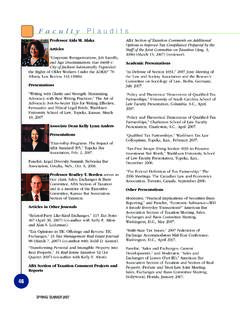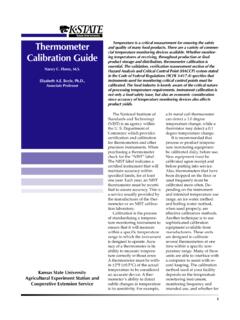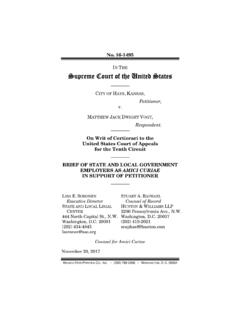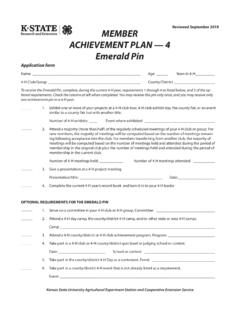Transcription of Kansas Agricultural Lease Law - Washburn University …
1 Article 2017-002 | February 8, 2017 (updated June 12, 2017). Kansas Agricultural Lease Law Roger A. McEowen Kansas Farm Bureau Professor of Agricultural Law and Taxation Washburn University School of Law, Topeka, KS. Overview Kansas does not have detailed legislation governing the rights and duties of farm tenants and landlords, although statutes exist setting out rights and duties under residential leases. The Kansas statutes dealing with farm leases are limited to matters such as termination of tenancies, assignment of leases, landlord's lien for rent, and duty to control noxious weeds. Where common-law rules remain in effect, they concern such things as removable fixtures, permanent improvements, rights of entry for a landlord or new tenant, Lease termination, rights of the tenant to harvest crops after the Lease expires, and liability for rent in case of a natural disaster.
2 A Lease is both a conveyance of an interest in real estate (the right of possession) and a contract. As a result, the legal issues concerning Agricultural leases can be broken down into property law issues and contract law issues. Property Law Aspects of Leases The right of possession. An Agricultural Lease represents an estate in land for a definite period of time that is fixed in advance. The property interest that is conveyed to the tenant is the right of possession. During the period of the tenancy, the owner of the land cannot use the land for the landowner's own purposes. For example, the landowner cannot hunt on the leased ground without the permission of the tenant unless the landowner retained these rights in a written Basically, the tenant has the right to make the decisions pertinent to farming the property, including the crops that are to be planted, without input or interference from the landowner (unless, of course, the Lease is in writing and specifies otherwise), and shoulders the associated responsibilities (such as the responsibility to maintain fences).
3 2 However, the landowner may enter the premises to make reasonable inspections, make repairs and/or installations, show the premises to prospective buyers, collect rent, and deliver notice of termination to the tenant. 1. However, as a practical matter, the tenant may not be allowed to continue the Lease in the future if the tenant does not allow the owner to hunt. 2. See, , Reynolds v. Kansas Dept. of Transportation, 43 799 (Kan. 2002) (wrongful death action brought against state, landlord, and tenant for death from automobile accident with tenant's cow on roadway; landlord dismissed from lawsuit). Washburn Agricultural Law and Tax Report | Article 2017-002 | | Page 1. If the landlord may be interested in pursuing mineral exploration or oil and gas drilling, the farm Lease should be in writing and contain a provision allowing the landowner (or the landowner's agents or employees) to enter and use the land for mineral exploration or oil and gas drilling.
4 Tenant's rights to harvest crops. An emblement is a crop growing on the leased premises, and the doctrine of emblements gives the tenant (or the tenant's estate) rights to the growing crop if the land is sold or the tenant dies before the crop is harvested. Relatedly, an away-going crop . is a crop that is growing upon termination of a land Lease . Thus, if a tenancy ends without the fault of the tenant before a growing crop is harvested, the tenant is entitled to the tenant's share of the crops upon harvest. An exception exists, however, if the Lease has a fixed expiration date and the crops cannot be harvested before the expiration date. Generally, in a landlord-tenant setting, growing crops are considered the tenant's personal property absent a written agreement to the contrary.
5 Thus, if the tenancy is terminated after crops have been planted, but before harvest, the tenant is entitled to harvest the crops. But the tenant is protected only if the Lease is terminated by the landlord and not because of any action of the tenant. Also, the rule has no application when a written Lease is involved specifying the termination date of the Lease . But, in Meairs v. Watson,3 the parties executed a cash rent farm Lease with one-half due after wheat harvest by July 15 and the other half due by December 15 annually. The Lease specified that it ran from May 2, 2006 to December 31, 2011. In the spring of 2011, the surviving spouse landlord notified the tenant in writing that the Lease was ending on December 31, 2011 and that no fall-seeded crop should be planted.
6 Normally, that would be the end of the discussion. However, the written Lease contained language stating that the landlord gave the tenant peaceable possession of any land upon which crops are growing in the year of termination through and including the harvest thereof . The tenant planted wheat in the fall of 2011 and harvested the crop in June of 2012. The landlord sued on the basis that the Lease terminated at the end of 2011 and the tenant was on notice not to plant a fall crop. While the trial court agreed, the appellate court disagreed, noting that the Lease clearly stated that the tenant had the discretion to plant whatever crops the tenant wanted during the term of the Lease and the ability to harvest those crops. The doctrine of emblements may also be involved when the landlord dies during the term of the Lease and a growing crop exists.
7 Entitlement to the crop is fairly clear when the landlord owns a fee simple interest in the leased land the landlord's heirs succeed to the landlord's share of the crop. However, if the landlord owns less than a fee simple interest in the leased land (such as a life estate), the outcome may be different. The question is whether the deceased landlord's estate or the holder of the remainder interest is entitled to the landlord's share. In two 1977 Kansas cases,4 the landlord owned only a life estate interest in certain farm ground and leased it on shares to a tenant. The landlord died before the growing wheat crop was harvested, and the court held that the landlord's crop share was a personal asset of the landlord, entitling the landlord's estate to the landlord's crop share on the basis that growing crops are personal property.
8 The remainderman takes nothing. The Nebraska Supreme Court has reached a similar However, the Colorado Supreme Court has held that the remainderman was entitled to the landlord's share on the basis that the language in the deed creating the reserved life estate in the decedent had divested the estate of any rights to profits from the The Oregon Court of 3. No. 111,114, 2015 Kan. App. Unpub. LEXIS 52 (Kan. Ct. App. Jan. 23, 2015). 4. Finley v. McClure, 222 Kan. 637, 567 851 (1977); Rewerts v. Whittington, 1 Kan. App. 2d 557, 571 58. (1977). 5. Heinold v. Siecke, 257 Neb. 413, 598 58 (1999). 6. Williams v. Stander, 143 Colo. 469, 354 492 (1960). Washburn Agricultural Law and Tax Report | Article 2017-002 | | Page 2. Appeals has followed the Colorado approach on the basis that title to growing crops is in the lessee, rent is not due until harvest (under a crop share Lease ) and upon harvest the remainderman has a present interest in the Some states have statutes governing the apportioning of rent when a life tenant landlord dies with a growing crop in the ground.
9 For example, in Illinois, the landlord's estate is entitled to the portion of the rent that accrued before death, and the remainderman is entitled to the Of course, parties to an Agricultural Lease can avoid the application of the doctrine of emblements or the away -going crop doctrine by entering into a written Lease that contains language addressing the issue. Duty to control noxious weeds. Under Kansas law, absent a provision to the contrary in a written Lease , the party who either owns the land or supervises its use has the duty to control noxious So both the tenant and the landlord are responsible for noxious weed control since, during the Lease term, the tenant usually has exclusive supervision of the land. If noxious weeds are not properly controlled, the county weed supervisor, upon giving notice to the owner or operator of the land, has the authority to enter upon the land, perform any necessary treatment, and charge the landowner for weed control The cost of the treatment is not charged against the tenant.
10 If the county weed supervisor's cost for treatment is not paid within 30 days, it becomes a lien against the Permanent improvements. If the tenant erects permanent improvements on the leased property, the general rule, absent an agreement to the contrary, is that the tenant is not entitled to remove the improvements at the end of the term of the Lease . Permanent improvements include permanent buildings, soil conservation terraces, and improvements to existing structures. In addition, the tenant is generally not entitled to compensation for the value of permanent improvements the tenant places on the property, or the value the tenant adds to existing structures. However, a tenant may remove items that the tenant adds to the property which are not considered to be part of the real estate, such as portable buildings and feeders.









